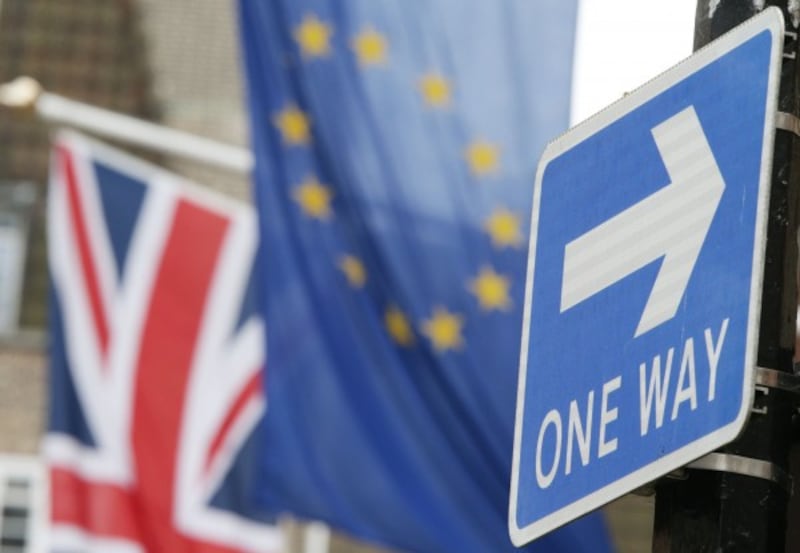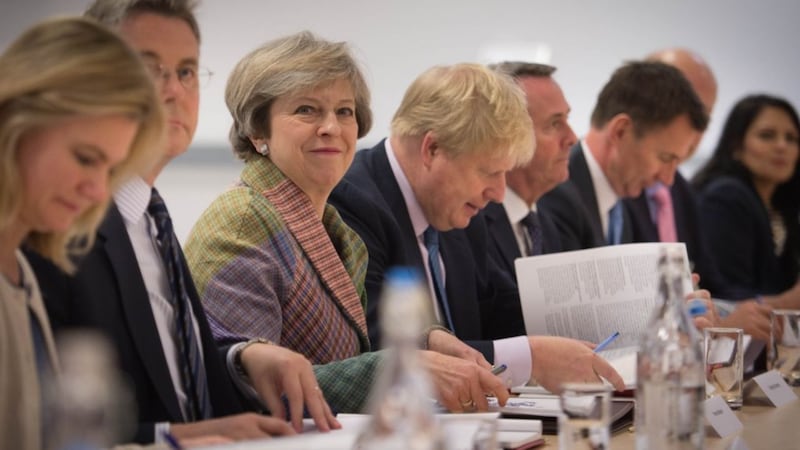The Government has published details of proposed legislation to transfer the whole of EU law on to the UK statute book as Britain leaves the European Union.
Brexit Secretary David Davis told the House of Commons that the Great Repeal Bill will provide “clarity and certainty” for businesses and citizens as Brexit takes place, with standards and rules maintained until Parliament decides to amend or remove them.
The Bill will repeal the European Communities Act 1972, which provides legal underpinning for Britain’s EU membership.
Here’s everything you need to know:
What was Davis’s message in the House of Commons?

Davis told MPs: “We have been clear that we want a smooth and orderly exit, and the Great Repeal Bill is integral to that approach.
“It will provide clarity and certainty for businesses, workers and consumers across the United Kingdom on the day we leave the EU. It will mean that as we exit the EU and seek a new deep and special partnership with the European Union, we will be doing so from the position where we have the same standards and rules.
He added that the bill would also ensure that the Government delivered on its promise to end “the supremacy of EU law in the UK as we exit”.
He said: “Our laws will then be made in London, Edinburgh, Cardiff and Belfast and interpreted not by judges in Luxembourg but by judges across the United Kingdom.”
What did the Prime Minister have to say?

Davis published details of the proposed bill in a white paper entitled Legislating For The United Kingdom’s Withdrawal From The European Union.
In a foreword to the paper, PM Theresa May said the bill would “provide maximum certainty as we leave the EU”, allowing businesses, public officials and individuals to plan for the future while Brexit negotiations are ongoing.
“The Great Repeal Bill is an important part of our plan to deliver a smooth and orderly Brexit that commands the confidence of all,” she said.
“The task ahead may be significant, but I am confident we can make it a success. This white paper is an essential step along the way.”
What will the Great Repeal Bill do?
Davis said the Great Repeal Bill will provide a power to “correct the statute book where necessary” using secondary legislation – which critics have warned will not allow full parliamentary scrutiny of the process.
He added: “This power will be time limited and Parliament will need to be satisfied that the procedures in the Bill for making and approving the secondary legislation are appropriate.”
There was a “balance to be struck between the importance of scrutiny and correcting the statute book in time”, he said.
What about the European Court of Justice?

Davis said the Bill will not give the European Court of Justice (ECJ) a “future role” in the interpretation of UK laws, and courts will not be obliged to consider cases decided by the ECJ after Brexit.
But while EU-derived law is on the UK statute book “it is essential that there is common understanding” of that legislation, so courts will refer to ECJ case law “as it exists on the day we leave the EU”.
“This approach maximises legal certainty at the point of departure, but our intention is not to fossilise the past decisions of the ECJ,” he said.
ECJ case law would be given the same status as Supreme Court decisions, which can be overruled by subsequent rulings in the UK’s highest court.
What major changes are expected?
UK Government will "remove" the Charter of Fundamental Rights from UK law pic.twitter.com/aqqrLAMfHT
— Faisal Islam (@faisalislam) March 30, 2017
Davis reiterated the Prime Minister’s intention to grant “significant” extra decision-making powers to the devolved administrations as jurisdiction returns from Brussels.But he stressed that “common UK frameworks” may be needed in some areas in order to preserve the working of the internal market.The white paper confirmed that the Government intends to pass a number of further bills over the next two years to prepare for specific aspects of Brexit, including a customs bill and an immigration bill.While making clear that there are “no plans” to pull the UK out of the European Convention on Human Rights, it stated that the EU’s Charter of Fundamental Rights will not be converted into UK law.The loss of charter protections will not affect individuals’ “substantive rights”, which are already covered by human rights legislation in the UK or international agreements to which Britain is a signatory, said the paper.
How challenging will it be?

Although it had no precise figure for the number of EU rules which will be transferred into domestic law, it noted that there are currently more than 12,000 EU regulations in force, while Parliament has passed 7,900 statutory instruments implementing EU legislation and 186 Acts which incorporate a degree of EU influence.A “very significant proportion” of EU-derived laws contain provisions which will not function effectively without amendment, but which are not appropriate for primary legislation, said the paper. Attempting to make technical changes of this kind through primary legislation would create a “prohibitively large” amount of work for Parliament.Instead, around 800 to 1,000 statutory instruments will be introduced – almost as many as Parliament passes in an average year – in an effort to strike a balance “between the importance of scrutiny and the speed of this process”.
What’s been the reaction?

Campaigner Gina Miller, who successfully took the Government to court over its plans to trigger Brexit without parliamentary approval, said she was considering legal action to challenge the use of Henry VIII powers to alter individuals’ rights.Speaking to Emma Barnett on BBC Radio 5 Live Daily, she said: “The Government has already blotted its copybook by trying to bypass Parliament and use the Royal Prerogative, so if there is any sniff that they are trying to use Henry VIII powers, that would be profoundly unparliamentary and undemocratic, and I would seek legal advice, because what you are doing is setting a precedent that Government could bypass Parliament.”Labour MP Chuka Umunna, chairman of Vote Leave Watch, described the Great Repeal Bill as “an immense undertaking, fraught with danger”.“Right-wing Tory Brexiteers like Liam Fox and Priti Patel have spent years waiting for this moment to cut the rights of British working people,” said Umunna. “From anti-discrimination laws to the Social Chapter to ECJ case law providing holiday pay, too many Conservatives see Brexit as a chance for a damaging bonfire of regulations.”








